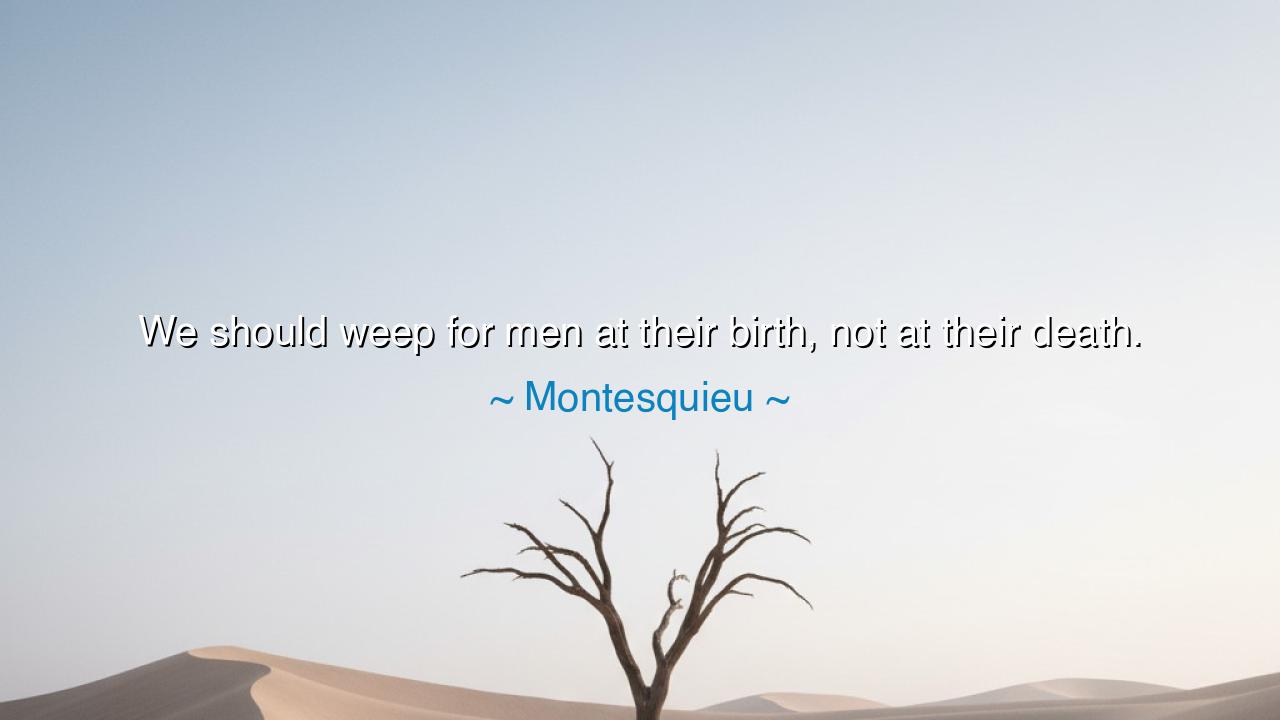
We should weep for men at their birth, not at their death.






“We should weep for men at their birth, not at their death.” Thus spoke Montesquieu, the philosopher of reason and liberty, whose mind illuminated the twilight of Europe before the coming of revolution. In these words, he utters not a cry of despair, but a profound meditation on the nature of human existence. At first glance, the saying seems strange, even inverted—should we not mourn the end of life, and celebrate its beginning? Yet beneath its surface lies the wisdom of ages: that to be born is to enter into struggle, and that death, when it comes, may be not an enemy, but a release.
The origin of this quote arises from Montesquieu’s reflections on the condition of mankind in a world governed by folly, injustice, and suffering. Writing in the eighteenth century, he lived at a time when reason was awakening, but tyranny and ignorance still cast long shadows. He observed how men were born into a world not of their choosing—a world where ambition, greed, and cruelty often ruled more strongly than virtue. Thus, when a child came into the light, he saw not merely the miracle of life, but the beginning of pain, loss, and toil. To live was to struggle, and to struggle was to suffer. In this way, he turned the usual ritual of mourning on its head: birth, not death, was the moment most worthy of tears, for it marked the soul’s descent into the trials of mortality.
And yet, these words are not nihilistic. Montesquieu does not despise life—he reveres it. He simply recognizes that life’s beauty is inseparable from its sorrow, that every joy we taste is bought with the price of labor, and every love we know carries the seed of loss. To weep at birth is not to curse existence, but to acknowledge its gravity—to honor the immense courage it takes for the soul to enter the battlefield of time. When death comes, by contrast, the philosopher saw peace: a return to the stillness from which all being first emerged, a reunion with the eternal. Thus, to weep at death is to misunderstand the order of nature. The end of suffering should not be feared, but accepted with reverence.
Consider, O listener, the tale of Siddhartha Gautama, the prince who became the Buddha. When he was born, it is said that a wise sage came to his father and declared, “This child shall either become a great ruler or a great renunciant.” And yet, beneath that prophecy lay sorrow, for the sage also foresaw that the boy would know suffering. Indeed, when Siddhartha later beheld old age, sickness, and death, he realized the truth of Montesquieu’s lament—that life itself is bound to pain, and that only through understanding can one be freed. He left his palace, sought wisdom in the wilderness, and found enlightenment not by fleeing death, but by accepting it as the natural companion of birth.
Montesquieu’s words, like those of the Buddha, compel us to look upon existence with open eyes. Too often, we celebrate the coming of life with joy, but we do not prepare the soul for what life demands: resilience, compassion, and purpose. We decorate the cradle with garlands, but we do not arm the heart with wisdom. The philosopher reminds us that the moment of birth is the moment of enlistment—the beginning of the soul’s journey through the storms of experience. To be born is to take up arms in the eternal war between ignorance and truth, between fear and love.
And yet, there is a paradox of hope within this sorrow. For if life is a trial, it is also an opportunity—the only chance we have to grow, to learn, to love, to leave behind light for others to follow. To weep for birth is to honor the burden of this calling; to live well is to transform that burden into meaning. The tears shed at the cradle, then, are not tears of despair but of awe—an acknowledgment of the immense courage every soul must carry to endure the pain and beauty of being human.
Thus, when death comes, we should not weep for the one who has gone, but give thanks that their journey is complete. The struggles of the flesh, the loneliness of the mind, the ache of longing—all are laid to rest. The traveler has reached home. To mourn their passing is to forget the peace that lies beyond the veil; to rejoice at their birth is to forget the trials they must face. Life is a sacred battle, and death its release.
So, my friends, take from Montesquieu’s wisdom a lesson in perspective. Do not fear death, and do not romanticize birth. Instead, honor life for what it truly is—a sacred trial, an arena where the soul is tested, shaped, and refined. Prepare your children not for comfort, but for courage. Teach them not to seek an easy path, but a meaningful one. And when your own end approaches, greet it not with terror, but with serenity, knowing that the tears once shed at your birth have been redeemed by the life you lived. For in that moment, you will understand the truth of the philosopher’s words: that the tragedy lies not in death, but in the forgetting of how to live.






AAdministratorAdministrator
Welcome, honored guests. Please leave a comment, we will respond soon